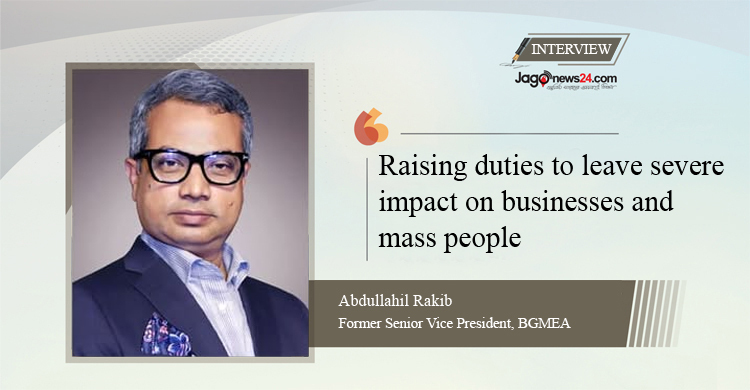Industry shouldn’t suffer while complying with IMF-WB conditions

“The reforms proposed by the International Monetary Fund (IMF) and the World Bank are beneficial for the country's economy. However, these conditions must be implemented without harming industries or stifling new investments and job creation,” said Abdullahil Rakib, Managing Director of Team Group and former Senior Vice President of the Bangladesh Garment Manufacturers and Exporters Association (BGMEA), in an interview with Jago News' Ibrahim Hussain Ovi.
Jago News: What challenges do you foresee for the export industry this year?
Abdullahil Rakib: The challenges we faced in 2024 persist in 2025. One of the critical issues is the confidence crisis among global buyers, which is vital for sustaining the export industry. Political stability plays a significant role in restoring this confidence, and currently, the absence of an elected government is a barrier.
Moreover, proper law enforcement is crucial for maintaining discipline and security in the labour sector. Unfortunately, the lack of clear directives is limiting their effectiveness. An elected government is essential to ensure the proper utilisation of law enforcement and to inspire both domestic and foreign investment.
Jago News: What steps are needed to revive the export sector?
Abdullahil Rakib: Business owners must be given the opportunity to recover from the losses caused by political instability. The recent decision to increase various types of duties will have a significant impact on businesses and the livelihoods of ordinary people. While it is important to comply with the conditions set by the IMF and the World Bank, these measures should not harm the industry. If we fail to make proper investments, factories will shut down, leading to increased instability and rising unemployment in the country.
The government must engage with business leaders to address the industry's needs seriously and as a priority. Without such collaboration, the business opportunities available in 2025 will remain underutilised.
The recent increase in duties adds further challenges, especially for businesses and common citizens. It is crucial to strike a balance between meeting international obligations and protecting the industry from harm.
Currently, there is strong demand for export products. If we fail to meet this demand, the sector risks incurring losses. To capitalize on these opportunities, the government must take proactive steps and work to improve law and order across the country.
Jago News: How can worker dissatisfaction be mitigated?
Abdullahil Rakib: Worker dissatisfaction remains a major challenge. Last year, despite meeting 18 demands approved by the government, discontent still arose in some factories. This highlights that meeting demands alone isn’t sufficient.
A robust implementation of law and order is essential. Criminal activities, sabotage, and factory vandalism must be addressed effectively. Adequate security measures are critical to ensuring worker satisfaction and maintaining buyer confidence.
Jago News: What would you like to communicate to global buyers this year?
Abdullahil Rakib: Buyers are always seeking opportunities, and the more we offer, the more they will expect. To navigate this dynamic, we must focus on enhancing our skills and improving product quality. Strong negotiation is key to maintaining a sustainable business relationship with buyers.
The government should prioritise addressing the needs of the industry by engaging directly with traders. Without such efforts, we risk missing out on the business opportunities available in 2025.
At the same time, buyers must uphold their ethical commitments. There is often a gap in their responsibility when it comes to fair practices. While they frequently advocate for wage implementation and increments, they do not consistently honour their promises to adjust prices accordingly.
For instance, buyers sometimes assure manufacturers that they will increase product prices in response to wage hikes. However, in many cases, these commitments remain unfulfilled, leaving manufacturers to bear the brunt of increased costs. Ensuring ethical practices and mutual accountability is essential for fostering a sustainable and equitable business environment.
Jago News: What are the primary needs for small and medium industries this year?
Abdullahil Rakib: The industry’s biggest challenge today is the rising cost of production. The implementation of the 2023 wage reforms has led to the closure of 160 factories, with many others teetering on the brink. Additionally, energy costs have surged by 286%, while rising interest rates have driven up the cost of investment. Combined with escalating inflation, these factors have left small and medium industries (SMEs) struggling to survive.
To achieve the goal of becoming the 35th largest economy in the world, special attention must be given to SMEs, as they are the foundation of future large-scale industries. Targeted incentives and robust policy support are essential to enable their growth and resilience.
Unfortunately, SMEs are not receiving the support they need. Stronger policy measures and a more business-friendly environment are required to empower entrepreneurs. With the right support, businesses can make new investments, generate employment, and contribute significantly to economic growth.
Policymakers must prioritize the needs of SMEs. Providing tailored incentives and strategic policies will not only help create jobs but also expand the economy. By fostering the growth of SMEs today, we are ensuring a more prosperous and sustainable industrial landscape for tomorrow.



